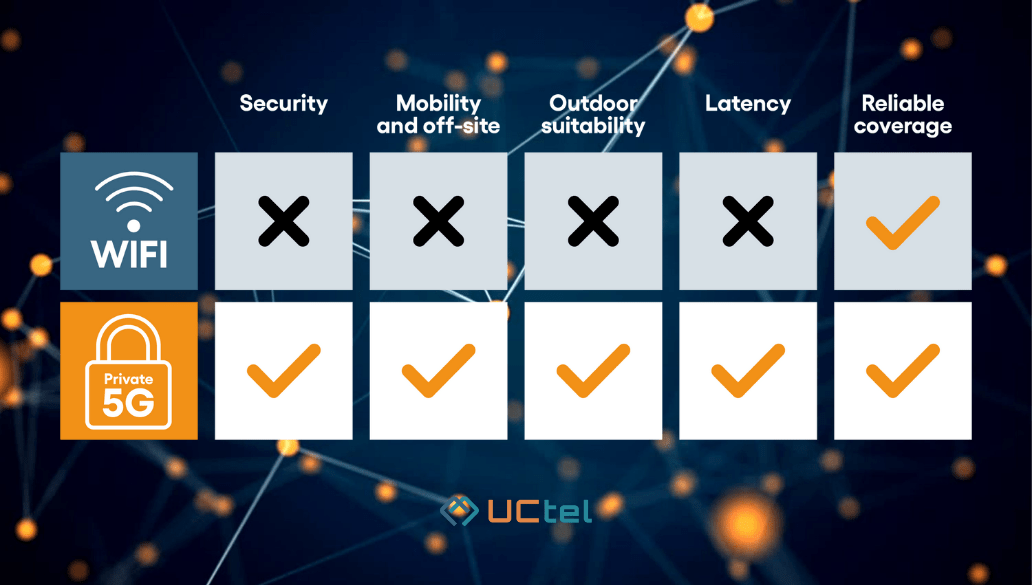
5 Private 5G Use Cases for Commercial & Industrial Environments
Table of contents
Private 5G networks are creating waves across the business world. Being far more advanced than 5G or Wi-Fi, this emerging technology offers higher bandwidth, lower latency, bolstered security, and massive data handling capabilities. This powerful combination is set to transform operations in nearly every industry.
In this article, we’re discussing private 5G use cases, as well as shedding light on how the improved connection can revolutionise robotics and heavy machinery operations, AR/VR experiences, IoT and automation, supply chain optimisation, and even smart agriculture. Let’s start!
Robotics and Heavy Machinery
Private 5G enables a new generation of autonomous mobile robots (AMRs) and remotely operated machinery across warehouse, manufacturing, and construction sites.
Key benefits:
- Supports real-time vehicle-to-vehicle (V2V) communication for efficient coordination;
- Enables remote operation over large areas with no lag or disruption;
- Boosts productivity and automation by integrating IoT sensors and AI. Learn more about the benefits of 5G in manufacturing.
Compared to Wi-Fi, private 5G offers near-instant response times and supports high device density — which is crucial for coordinating fleets of robots and heavy equipment. Interference is minimised, coverage is consistent, and roaming is seamless.
| Comparison | Using Wi-Fi | Using Private 5G |
|---|---|---|
| Reliability | Wi-Fi frequently suffers from dead spots and interference | Consistent quality of service with unmatched connectivity |
| Control | Limited control over the public Wi-Fi infrastructure | Full customisation and optimisation |
| Security | Public standards-based protocols | Isolated network slices |
| Scale | Hundreds of devices per access point | 10,000+ devices per base station |
BMW: autonomous logistics
BMW is one of the main use cases of private 5G networks for industrial business. The company implemented private 5G to enhance its automotive manufacturing operations. At their factory campus in Regensburg, Germany, they’ve deployed a private 5G testing area to optimise logistics through the use of smart robotic platforms.
Self-driving transport systems can flexibly move materials without guide paths, while autonomous forklifts can dynamically coordinate to handle various warehouse tasks. These examples of 5G use cases demonstrate how industrial environments can leverage private 5G to maximize productivity.
AR/VR Experiences
Private 5G can create highly immersive augmented reality (AR) and virtual reality (VR) experiences. The high bandwidth and ultralow latency allow users to have the engaging experience of a dedicated VR headset on regular smart glasses.
Key benefits:
- Supports HD video streaming with near-zero lag for immersive AR/VR;
- Allows use of AR/VR solutions using smart glasses instead of bulky headsets;
- Drives efficiencies and accuracy by overlaying digital information onto the real world.
While Wi-Fi may struggle to deliver, private 5G reliability provides the foundation for next-generation XR innovations. Training scenarios, assisted repairs/operations, and even venue exploration can all be enhanced through best-in-class wireless connectivity.
| Comparison | Using Wi-Fi | Using Private 5G |
|---|---|---|
| Latency | Laggy 50 ms+ latency | Imperceptible <10ms motion to photon latency |
| Consistency | Jitter and lag can easily ruin the experience | Predictable, consistent throughput |
| Mobility | Limited range and device support | Seamless mobility across broad geo areas |
| Concurrency | Congestion as more users hop on | Guaranteed capacity regardless of users |
ThyssenKrupp & HoloLens 2
ThyssenKrupp, another example of use cases of private 5G networks for commercial businesses, combines the technology with HoloLens 2 glasses to let remote experts see what on-site technicians see in real-time. This augmented assistance makes complex repairs significantly easier. This ingenious development hints at the scope of potential private 5G applications for any industry that can benefit from instant, precise communications.
IoT and Automation
Regarding enterprise IoT innovations, private 5G is the clear connectivity of choice. The high-density, low-power IoT devices central to digitising business environments require always-on reliability and real-time command/control that is only possible with stable connection 5G offers.
Sensors, asset trackers, cameras, controllers, and industrial appliances can all be networked to feed enterprise analytics and automation platforms. This can empower data-driven operations from predictive maintenance to inventory optimisation and beyond. For any sizable IoT deployment, private 5G should be considered to support it.
Biggest advantages:
- Securely connects thousands of IoT devices per cell site;
- Enables real-time tracking, monitoring, and analytics;
- Drives efficiencies through ML-powered automation.
| Comparison | Using Wi-Fi | Using Private 5G |
|---|---|---|
| Scale | 100’s devices per access point | 10,000+ devices supported |
| Consistency | Performance degrades with interference and congestion | Reliable quality of service regardless of demand |
| Analytics | Limited visibility from Wi-Fi infrastructure | Deep network analytics and customisation |
| Control | Constrained by public carrier equipment and licenses | Purpose-built network tailored for the specific environment |
Here, you can also read why campuses need private 5G.
Rio Tinto: 5G in underground mining
Mining leader Rio Tinto is another member of our list of private 5G use cases for commercial environments. The company uses underground LTE and 5G connectivity to perform its subterranean operations. The network links up drilling equipment, driverless trucks, sensors, and control systems to automate ore extraction across their mines. Rio Tinto estimates this private 5G-enabled automation can boost productivity by over 20%, which is extremely impressive by the industry standards.
Supply Chain Optimisation
Global commerce depends on the constant flow of goods through interconnected supply chain networks. Ports are integral in managing this flow and serve as distribution hubs powering downstream supply chains. It’s easy to see how such infrastructure can benefit from 5G-powered automation.
Key benefits:
- Ultra-low latency connectivity enables real-time control and data analytics;
- Massive network capacity supports streams of data from numerous sensors;
- Precision location tracking provides accurate positioning of assets.
| Comparison | Using Wi-Fi | Using Private 5G |
|---|---|---|
| Reliability | Wi-Fi often suffers from dead spots, leading to data gaps | Pervasive high-reliability connectivity |
| Interoperability | Varied quality across different terminal operator Wi-Fi networks | Standardised performance across all nodes |
| Positioning | Imprecise indoor positioning data | Centimetre accurate positioning solutions |
| Scale | Congestion as more devices saturate the network | Massive capacity essential for handling port-scale systems |
Read more about the benefits of 5G in the energy sector.
The Port of Hamburg: MoNArch 5G
The Port of Hamburg in Germany has become another successful use case of private 5G networks. The network provides connectivity across 154 square kilometres of port infrastructure. This enables real-time tracking of shipments from their arrival at the port to processing and handover, providing end-to-end transparency. Sensors on containers relay information like location, temperature, humidity and door open alerts over 5G to enable constant monitoring of critical parameters.
Smart Agriculture
In the competitive world of commercial agriculture, connectivity powers the cutting-edge innovations needed to maximise crop yields. Autonomous farm equipment, aerial data analytics, and advanced sensors are all examples of private 5G use cases for the industry, unlocking significant productivity gains for the world’s farmers.
Key benefits:
- Wide area coverage provides connectivity across entire fields;
- Low latency allows for real-time transfer of sensor data for quick insights;
- High bandwidth supports numerous high-definition sensor streams;
- Precise positioning enables accurate tracking of livestock and equipment;
- High level of sustainability of the 5G network.
Private 5G purpose-built for sprawling farm properties provide the backbone for such revolutionary approaches to farming. The reliable wireless coverage can connect everything, from livestock health trackers to self-steering tractors, into one efficient and productive whole.
| Comparison | Using Wi-Fi | Using Private 5G |
|---|---|---|
| Range | Constrained wireless coverage | Miles-wide connectivity across the acreage |
| Reliability | Dead zones create data gaps | Consistent high-performance |
| Positioning | Limited accuracy for tracking | Hyper accurate positioning data |
| Responsiveness | Laggy data impacts actionable insights | Real-time data and analysis |
5G RuralFirst
5G RuralFirst is an obvious example of private 5G use cases in smart agriculture. It runs multiple private 5G testbeds at farms in the UK, using the technology to apply new sustainable agriculture strategies.
Conclusion
As evident from the top use cases for private 5G networks, this technology brings significant operational gains in robotics, immersive experiences, automation, video analytics, logistics, etc.
While each use case is different, private 5G undoubtedly marks a significant leap forward in reliable, high-performance wireless connectivity for commercial and industrial sectors. Businesses should leverage private 5G capabilities to unlock innovation and create intelligent, data-driven solutions.






